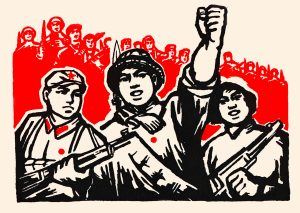Communism: “It’s about what’s best for everyone”

PUGET SOUND, WASHINGTON (US), March 7—”People in the factory may say communism is a bad system, but there are many good things about communism,” declared a new Boeing worker friend. He was referring to how many Chinese people welcomed mass testing for COVID-19.
He described pictures of Chinese shoppers undergoing required testing for fever. “These things go beyond individual rights. It is about what is best for everyone,” he said. He added that the tests were free and were for the common good.
We discussed how China is not a communist country. Then we reviewed the struggle for communism there, particularly the Cultural Revolution (1966-1976). He still has relatives in China. He thinks that some of the good things the Chinese government did were a residue of this struggle.
During the last week, many other workers have started to question the anti-communist propaganda that has swamped us for years in the US.
A friend who distributed the ICWP immigration pamphlet liked its sharp criticism of how capitalist governments abuse migrants, but “wasn’t so sure about the communist stuff.” More recently, she read a draft of the article about communist relations of production. She pointed to every paragraph about communist relations of production, saying, “That’s right, that’s right.”
Communist Class Struggle on the Job
Then, at the morning crew meeting, right-wingers started up with xenophobic, racist and anti-communist attacks on Chinese people. “It started in China, in a lab,” one said, promoting an anti-communist conspiracy theory.
“We had time to prepare, but capitalism failed us again,” retorted another crew member. The fascists fell silent. The rest of us bombarded management with hostile questions: “What if we have to quarantine? Will we be paid?” “Will we have to use sick time?” “How can we trust the company when company policy took away even the Clorox disinfecting wipes we used to have to wipe down the benches and keyboards?”
The supervisor made excuses. He said he “didn’t know” and to “check with him” before taking off from work. The whole experience made workers more inclined to consider an alternative communist system in discussions the rest of the day.
Some friends had rejected Red Flag in the past because it is communist. A number of them read the draft article. Some took an issue of the last paper, including younger workers who read it for the first time. Everyone commented on the draft, and we incorporated many of their suggestions.
Workers Debate Communism vs. Socialism
Meanwhile, a worker at the other end of the factory texted for help. This Red Flag distributer’s co-workers had asked him what the difference is between communism and socialism.
He fell back on the definition he learned in school, saying: “Under communism, most property and economic resources are owned and controlled by the state (rather than individual citizens); under socialism, all citizens share equally in economic resources as allocated by a democratically elected government.”
A Party member remembered this definition from the federally mandated anti-communist curriculum he had endured in high school. It has no relation to reality.
Over the next two days, this comrade and his friend studied the draft article that caused such a stir at the crew meeting. In truth, the basic difference between socialism and communism is the mode of production.
Communism produces for the collective needs of the masses. Socialism maintains production for profit, wage slavery and the bosses’ dictatorship. Hence, it’s still capitalist and embodies all of the capitalist evils our friend hates. Democracy is just a cover for that dictatorship.
The different modes of production generate different societies with different ways of making decisions and different priorities. Only communism prioritizes the needs of the working class and completely eliminates money. Because socialism maintains money and therefore capitalist relations, it can never meet our needs.
The Red Flag distributer is not yet ready to completely abandon the anti-communist definition. He thinks socialism is more palatable to his fellow workers. We agreed to continue to discuss this.
We welcome workers’ interest in the detailed workings of a communist society. The way forward will include sharper ideological and practical struggle. In many ways, workers are asking ICWP to take on this struggle.

